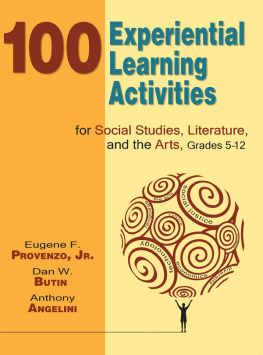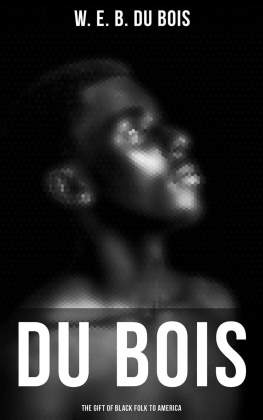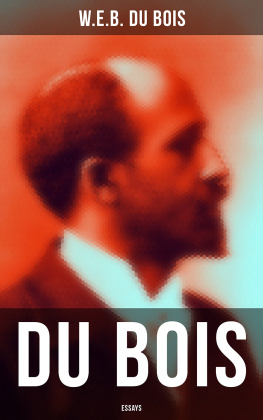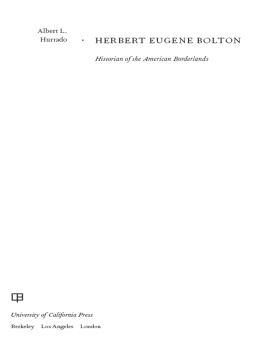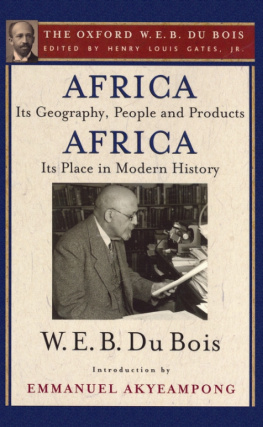First published 2012 by Left Coast Press, Inc.
Published 2016 by Routledge
2 Park Square, Milton Park, Abingdon, Oxon OX14 4RN
711 Third Avenue, New York, NY 10017, USA
Routledge is an imprint of the Taylor & Francis Group, an informa business
Copyright 2012 Taylor & Francis
All rights reserved. No part of this book may be reprinted or reproduced or utilised in any form or by any electronic, mechanical, or other means, now known or hereafter invented, including photocopying and recording, or in any information storage or retrieval system, without permission in writing from the publishers.
Notice:
Product or corporate names may be trademarks or registered trademarks, and are used only for identification and explanation without intent to infringe.
Library of Congress Cataloging-in-Publication Data:
Du Bois, W. E. B. (William Edward Burghardt), 1868-1963.
W. E. B. Du Bois on Africa / edited by Eugene F. Provenzo, Jr. and Edmund Abaka.
p. cm.
Includes bibliographical references and index.
ISBN 978-1-61132-180-7 (hardback : alk. paper)ISBN 978-1-61132-181-4 (pbk. : alk. paper)
1. BlacksSocial conditions. 2. Race relations. 3. Pan-Africanism. 4. AfricaRelations.
I. Provenzo, Eugene F. II. Abaka, Edmund III. Title.
HT1581.D85 2012
305.896dc23
2012005497
ISBN 978-1-61132-181-4 paperback
ISBN 978-1-61132-180-7 hardcover
What is Africa to me:
Copper sun or scarlet sea,
Jungle star or jungle track,
Strong bronzed men, or regal black
Women from whose loins I sprang
When the birds of Eden sang?
One three centuries removed
From the scenes his father loved,
Spicy grove, cinnamon tree,
What is Africa to me?
Countee Cullen
I n his 1940 autobiography, Dusk of Dawn, W. E. B. Du Bois included the above poem by Countee Cullen and then asked the question: What is Africa to me? That is the subject of this book, or more specifically: What is Africa to W. E. B. Du Bois? Our approach to answering this question is to assemble many of Du Bois original writings on Africa and to add commentary and background to them, as well as provide a larger interpretive discussion in our Introduction.
While Du Bois wrote indirectly about Africa in his 1895 doctoral dissertation, The Suppression of the African Slave Trade,1 it was not until the summer of 1900 that he wrote specifically about Africa. As part of the report for the Pan-African Conference held in London, from July 23 to July 25, 1900, Du Bois along with Alexander Walters, Henry B. Brown, and H. Sylvester Williams wrote a declaration, To the Nations of the World. (See the first document in this work.) In this remarkably prophetic work, which was almost certainly written primarily by Du Bois, his most famous quote was published: the problem of the twentieth century is the problem of the color line.
In the declaration, there is the remarkable recognition (for this period) of Africas contribution to world history. It argues that, while the darker races of Africa are supposedly less advanced than those of European society, This has not always been the case in the past and certainly the worlds history, both ancient and modern, has given many instances of no despicable ability and capacity among the blackest races of men. (p. 10). Perhaps even more noteworthy is the declarations argument that the people of Africa were being sacrificed to the greed of Western colonizers, their liberties taken away, their family life debauched, their just aspirations repressed, and avenues of advancement and culture taken away from them. Du Bois and his co-authors go on to call for the recognition of Europes ruthless economic exploitation of Africa, and that it be put to an end.
To the Nations of the World sets forth many of the themes about Africa that Du Bois pursued until his death sixty-three years later in 1963. It was in London at the Pan-African Conference of 1900 that he began his role as a spokesman for Pan-Africanism and identified the problem of racism as not simply a phenomenon in the United States, but as part of a larger international problem of racial discrimination, exploitation, and colonization. Thus Du Bois laid the foundation for future African activists and intellectuals, from Nanmdi Azikiwe, Emmanuel Kwegyir Aggrey, Julius Nyerere, to George Padmore and Kwame Nkrumahall key future leaders of the modern Pan-African movement.
We believe that Du Bois significance as an international figure for racial equality and social justice, and as a champion of Africa and its peoples, has been underemphasized in much of the scholarly writing about himparticularly in the United States. The writings collected in this volume make clear how prophetic and important Du Bois was as a voice calling for the freedom of the oppressed peoples of Africa and of the larger Black diaspora. Du Bois did not simply theorize about Africa. He wrote at length about its history, provided eyewitness accounts of its cultures, and championed the rights of its people. In the United States, he was among the very few authors during the first half of the twentieth century who wrote about Africa for African Americans. This is particularly significant considering the fact that writings on Africa by European explorers, travelers, and colonial officials often perpetuated the idea of an Africa without a history of its ownpart of a process of colonization that the theorist Edward Said has described in an Arab context as one of Orientalizationa topic we will deal with in more detail in the Introduction.2
Du Boiss accomplishments as an early author on Africa are even more noteworthy, since there was so little research that was published and available to him on the subject. Particularly in his early articles in the Horizon and The Crisis, and the early chapters of his brief 1915 history, The Negro (a work that is dominated by African themes and content), Du Bois provided a much needed antidote to European models of domination, control, and exploitation.
As a minor note, we have included a number of unique articles, addresses, and interviews by Du Bois on the subject of Africa from the end of his life. These pieces are available primarily in the form of carbon copies in the Du Bois Papers included in the Archives and Special Collections at the University of Massachusetts at Amherst. Some of these materials have incomplete citations for their sourcesparticularly English versions of articles that were translated and published in Russian.
* * *
As the editors of this collection, we believe we have a unique perspective. Eugene Provenzo is an educational historian and social theorist who has had a lifelong interest in Du Bois as a cultural and intellectual force. Edmund Abaka is an historian and Africanist, originally from Ghana, who is interested in Du Bois as the father of Pan-Africanism and one of the early scholars who gave Africa a voice on the world stage. We believe that whatever the limitations of our work, our perspectives (and we hope insights) have been extended and strengthened by our different backgrounds and interests, and our collaboration. Du Bois, who was at heart a Hegelian, would have appreciated the idea that from our differences could evolve a synthesis in our understanding of his work and his importance to the idea of Africa.








